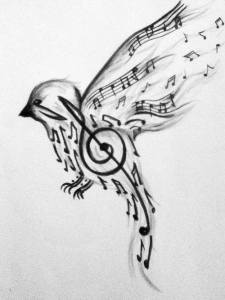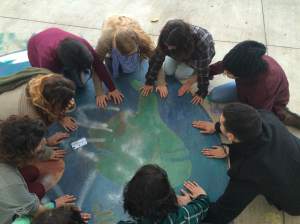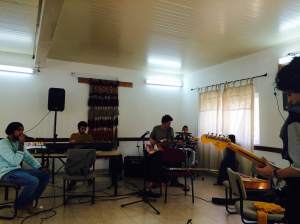Often as a practitioner-music educator, I find myself pondering many questions that arise from my work in practice and how they relate back to theory. Most days, questions arise that I would like to unpack further, but cannot find the time. In fact perhaps each day new questions arise that I can never fully unpack. Many times I feel lousy that there is not the time to explore everything that comes up in practice as fully as I would like. I assume this constant struggle with time is the story of every educator. During these times, I think of my teachers and inspirations who somehow seem to do so much, if not all, as practitioner-educators. Teach. Question. Write. Ponder. Produce. Examine. Challenge. Reflect. Suggest. Be Present. In the spirit of their tireless work, I will share one of my current quandaries.
Recently, I wrote an article for 972.Mag questioning the criticality of the work of Israeli-Palestinian peacebuilding and reconciliation educational organizations, emphasizing that if even we in the peacebuilding and reconciliation fields cannot name the inequality in front of us and within our programs, how do we expect those in our spaces of learning and in society to do so either? As you have perhaps guessed, I am also a part of this field, working for two such music education NGOs. But even the former statement is overly simplified, and paints an incomplete explanation of the issue at hand. We, as educator-practitioners, must constantly look much closer and deeper through a critical lens at what we are creating (or not creating) within our programs. Every decision and action of ours, whether in determining structure and pedagogy of the program to facilitation techniques and overall theory of dialogue, does not happen within a vacuum. The continuity of experience (Dewey, 2007) for our youth musicians[1] within our programs is in continuous formation, and directly affected by our choices of action, and inaction. We are responsible, and one of the largest “of all pedagogical fallacies is the notion that a person learns only the particular things she/he is studying at the time.” (Dewey, 2007, p.48) All of these factors matter. And in that same light, all of these factors determine if we, as practitioner-educators, are actively choosing to build with our youth musicians a just, positive peace. (Barash, 2009, p.146)
How can we look at this issue through an educational theory lens? A good starting place is beginning with John Dewey’s theoretical examinations of educational experience or experiential learning. Experiential learning is a basic component for all learning, and a particular component of many Israeli and Palestinian peacebuilding and reconciliation educational organizations with such a large focus, across all mediums, on sharing one’s narrative and experiences, and learning by listening to others. John Dewey in Experience and Education explores the differences between traditional and progressive education, with a concentration on the possibilities of either, and how these relate to the conception of learning through experience.
Dewey challenges the assumption that traditional education is inherently negative, and therefore against progress, while progressive education must be automatically better by default because it is modern. Instead of placing the old and the new as reactionary, direct opposites of each other, Dewey points out that experiences aren’t lacking in traditional education, but rather they are “defective and wrong character- wrong and defective from the standpoint of connection with further experience.” (Dewey, 2007, p.27) The inability of traditional education to foster experiences that lead to further growth limits learning, equality within learning experiences, and the ability to adapt to our globalizing, ever changing world. In other words, “It is not enough to insist upon the necessity of experience, nor even of activity in experience. Everything depends upon the quality of the experience which is had.” (Dewey, 2007, p.27) An often missed point is that this does not only serve as a reason to not teach with traditional education, but in addition applies dually to any type of progressive education in both formal and non-formal education.
How does this relate back to musical spaces of learning amidst inter-group conflict? The majority of Israeli-Palestinian peacebuilding and reconciliation educational organizations exist within the structure of non-formal education, meaning that they exist outside of the formal school system, but have some type of structured learning, largely with an emphasis on experiential learning. In any of these educational youth programs, music or not, each has the potential to either be mis-educative or lead to further growth depending on its structure and pedagogy. “The belief that all genuine education comes about through experiences does not mean that all experiences are genuinely or equally educative.” (Dewey, 2007, p.25) Some experiences can be “mis-educative” (Dewey, 2007), and any experience that is mis-educative “has the effect of arresting or distorting the growth of further experience.” (Dewey, 2007, p.25) Of course the obvious choice is: we would all like for our programs to lead to further growth. Yet, the chances of this happening is connected to our ability to foster quality experiences dependent on:
- “an immediate aspect of agreeableness or disagreeableness” (Dewey, 2007, p.27)
- “its influence upon later experiences” (Dewey, 2007, p.27)
If inter-group power dynamics manifesting in the representation of who is speaking over another, constant use of the dominating language in the group, speaking in a language not everyone understands equally, and control of one ethnicity group in decision-making processes within the group over the other ethnicity, are not identified, challenged, and disrupted, quality of experiences will be lost and be unequal. Practitioner-educators and staff personnel cannot just learn to be aware of what are these dynamics. A critical, youth-centered pedagogy and structure must be adopted, and even beyond that, implemented with Paulo Freire’s critical ingredients of love, care, humility, and solidarity.
Like most uncharted educational territory, new questions bubble to the surface, such as: what is a “quality-of-experience” educational structure for a music peacebuilding/reconciliation education program? What should dialogue look like? How should understanding and knowledge be assessed? What is considered a successful program? All of these questions could be answered differently by different organizations depending on context. No matter the context though, addressing power dynamics and the experiences of learning within the bounds of the program, and considering experiences of learning outside of the program occurring simultaneously, are nonnegotiable. In the words of Dewey, “A principle responsibility of educators is that they not only be aware of the general principle of the shaping of actual experience by environing conditions, but that they also recognize in the concrete what surroundings are conducive to having experiences that lead to growth.” (Dewey, 2007, p.40) This is even more crucial in peacebuilding and reconciliation educational organizations to challenge existing power dynamics while also transforming violent conflict. Ultimately, one cannot be won without the other.
Within a protracted conflict, cycles of violence and systemic injustice are reoccurring everyday, often affecting Israelis and Palestinians in disproportionate ways. As the conflict continues to spiral, its affect takes a toll on each ethnicities’ socialization. It is the duty of peacebuilding and reconciliation educational organizations of all mediums to disrupt this socialization of separation, segregation, violence, hate, and incitement by using a critical pedagogy in education to foster new structures and frameworks of equality, freedom, rights, and dignity. After all, education is not synonymous with socialization (Hansen, 2010), whereas the opposite is the case of socialization, which creates and informs experiences of learning, both of quality and mis-educative.
As music educator-facilitators, it is our responsibility to build a musical space that is loving, caring, dialogical, and critical for our youth musicians. Within this space as a location of possibilities (hooks, 1994), youth musicians are enabled to fully explore the boundlessness of music, while also learning for and about peacebuilding, nonviolence, solidarity, human rights, social justice, coexistence, and coresistence. Ultimately, this is a means and an end, a continuity of experiences, a process-product-process-product progression of raising the critical consciousness of youth musicians, in which they can transfer their new and renewed knowledge, understanding, and skills to less safe spaces in their world. We must pay attention (from the linguistic root “to hold”) to the balance of individual youth musician growth within the group dynamic and the overall encounter dynamic in and between the group identities of Israeli and Palestinian- not to mention as well gender dynamics. Our curriculum, or beginning formations of curriculum, must be built with the structures and pedagogy of values, such as equality, freedom, rights, dignity, in addition to musical content and pro-social skills, that will lead to (e)quality experiences[2] “that live fruitfully and creatively in subsequent experiences.” (Dewey, 2007, p.28)
Recognizing the need always for more context and examples, I leave you with a few questions to reflect upon and a few articles to peruse:
1. When building an educational musical space, what are our assumptions about those participating, and the underlying power dynamics within space, language, knowledge, and culture?
2. How do we address the needs and feelings of every youth musician equally? And along those lines, how can this musical space be a safe or safer space for every youth musician equally?
3. How do we introduce meaningful musical content through a critical pedagogy that is connected to the new, and yet the local? In other words how do we as music practitioner-educators foster a space where what is loyal to the local/known, and what is open to the new/unknown (David Hansen’s Cosmopolitanism and Education) can co-mingle, exploring harmonies and dissonances between the two and beyond.
4. Confrontation and pedagogy: Cultural secrets, trauma, and emotion in antioppressive pedagogies – Ann Berlak
5. How to Talk About Privilege to Someone Who Doesn’t Want To – Jaime Utt
6. Education and Experience – John Dewey
I hope these support further questioning and bubbling to the surface that will take us all beyond dualities and into places of “in-between” and “becoming,” as we navigate the daily challenges and excitements of this work with our youth musicians.
“The relation between freedom and the consciousness of possibility, between freedom and the imagination- the ability to make present what is absent, to summon up a condition that is not yet.” (Greene, 1988, p. 16)
[1] I refer to youth participants as “youth musicians” throughout the article to address specifically my context and for ease of understanding. The term “youth participants” of any project, whether arts-based, sports-based, etc., is also an applicable term instead of “youth musician” in every instance.
[2] I have placed the “(e)” in front of “quality” to emphasize that the quality of experience in an inter-group space depends on whether “equality” is present in structure, pedagogy, and content. This is a new theoretical musing of mine that I will investigate further in upcoming posts.
_________________________________________________
APA Citation: Gottesman, S. (2015, February 24).Reflections: Challenges of Building Critical Music Education Spaces Within Inter-Group Conflict. Retrieved from: https://musicintervention.wordpress.com/2015/02/24/reflections-challenges-of-building-critical-music-education-spaces-within-inter-group-conflict/
REFERENCES
1. Berlak, A.C. (2004). Confrontation and pedagogy: Cultural secrets, trauma, and emotion in antioppressive pedagogies. Counterpoints, 123-144.
2. Dewey, J. (2007). Experience and education. Simon and Schuster.
3. Freire, P. (2000). Pedagogy of the oppressed. Continuum.
4. Greene, M. (1988). “Freedom, education, and public spaces.” In The dialectic of freedom (pp. 1-23). New York: Teachers College Press.
5. Hansen, D. (2010). Cosmopolitanism and education: A view from the ground.The Teachers College Record, 112(1).




One thought on “Reflections: Challenges of Building Critical Music Education Spaces Within Inter-Group Conflict”